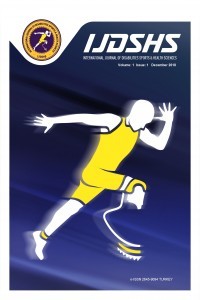Investigating The Relationship Between DigitalWell-Being and Cognitive and Emotional Consciousness in Sporting Consumers
Investigating The Relationship Between DigitalWell-Being and Cognitive and Emotional Consciousness in Sporting Consumers
Digital Well-Being Cognitive Sensory Conscious Awareness, Digital Well-Being in Sport Consumers,
___
- Aktepe, İ., & Tolan, Ö. (2020). Conscious awareness: a current review. Current approaches in psychiatry, 12(4), 534-561.
- Baer, R. A. (2011). Measuring mindfulness. Contemporary Buddhism, 12(01), 241-261.
- Baer, R. A., Lykins, E. L.B., & Peters, J. R. (2012). Mindfulness and self-compassion as predictors of psychological wellbeing in long-term meditators and matched nonmeditators. The Journal of Positive Psychology: Dedicated to furthering research and promoting good practice, 7(3), 230-238.
- Büyüköztürk, Ş., Çakmak, E., Akgün, Ö., Karadeniz, Ş., & Demirel, F. (2008). Scientific Research Methods (1. Edition). Pegem Akademi.
- Catak, P. D. (2012). The Turkish version of the Cognitive and Affective Mindfulness Scale-revised. Europe's Journal of Psychology, 8(4), 603-619.
- Carlson, L. E. (2012). Mindfulness-based interventions for physical conditions: a narrative review evaluating levels of evidence. ISRN Psychiatry, 2012.
- Demir, Ö., & Doğanay, A. (2009). Cognitive coaching approach in developing cognitive awareness skills. Educational Administration: Theory and Practice, 60(60), 601-624.
- Deniz, M. E., Erus, S. M., & Büyükcebeci, A. (2017). The mediating role of emotional intelligence in the relationship between mindfulness and psychological well-being. Turkish Journal of Psychological Counseling and Guidance, 7(47).
- Dawson, B., & Trapp, R. G. (2001). Probability & related topics for making inferences about data. Basic & Clinical Biostatistics (3rd Edition, pp. 69-72). Lange Medical Books/McGraw-Hill Medical Publishing Division. Dizen, M., Berenbaum, H., & Kerns, J. G. (2005). Emotional awareness and psychological needs. Cognition & Emotion, 19, 1140-1157.
- Flawell, J. H. (1978). Metacognitive development. In J. M. Scandura & C. J. Brainerd (Eds.), Structural/process theories of complex human behavior (pp. 19-60). Netherlands: Sijthoff and Noordoff.
- Fredrickson, B. L., Cohn, M. A., Coffey, K. A., Pek, J., & Finkel, S. M. (2008). Open hearts build lives: positive emotions, induced through loving-kindness meditation, build consequential personal resources. Journal of Personality and Social Psychology, 95(5), 1045.
- Frijda, N. H. (1993). Appraisal and beyond. Cognition & Emotion, 7(3-4), 225-231.
- Gui, M., Fasoli, M., & Carradore, R. (2017). Digital well-being: Developing a new theoretical tool for media literacy research. Italian Journal of Sociology of Education, 9(1), 155-173.
- Hayes, S. C. (2004). Acceptance and Commitment Therapy and the new behavior therapies mindfulness, acceptance, and relationship. In S. C. Hayes, V. M. Follette, & M. M. Linehan (Eds.), Mindfulness and acceptance: Expanding the cognitive-behavioral tradition (pp. 1-29). Guilford Publications.
- Herbert, J. D., & Forman, E. M. (2014). Mindfulness and acceptance techniques. In S. G. Hofmann, D. J. A. Dozois, W. Rief, & J. A. J. Smits (Eds.), The Wiley handbook of cognitive behavioral therapy (pp. 131-156). Wiley-Blackwell.
- Jimenez, S. S., Niles, B. L., & Park, C. L. (2010). A mindfulness model of affect regulation and depressive symptoms: Positive emotions, mood regulation expectancies, and self-acceptance as regulatory mechanisms. Personality and Individual Differences, 49(6), 645-650.
- Kabat-Zinn, J. (2005). Coming to our senses: Healing ourselves and the world through mindfulness. New York, NY: Hyperion.
- Kang, C., & Whittingham, K. (2010). Mindfulness: A dialogue between Buddhism and clinical psychology. Mindfulness, 1, 161-173.
- Karasar, N. (2014). Scientific research methods: concepts, techniques and principles (27th ed.). Ankara: Nobel Publishing House, 109-111.
- Leary, M. R., Tate, E. B., Adams, C. E., Allen, A. B., & Hancock, J. (2007). Self-compassion and reactions to unpleasant self-relevant events: The implications of treating oneself kindly. Journal of Personality and Social Psychology, 92, 887-904.
- Louca, A. (2003). The concept and instruction of metacognition. Teacher Development, 7(1), 9-30.
- Öztürk, E. (2018, September 12-14). Is digital well-being one of the current concepts of the digital revolution? (A scale development study) [Paper presentation]. 6th International Instructional Technologies and Teacher Education Symposium, Edirne, Türkiye.
- RSPH. (2017). Status of Mind. Retrieved from https://www.rsph.org.uk/our-work/campaigns/status-of-mind.html
- Stanton, A. L., Kirk, S. B., Cameron, C. L., & Danoff-Burg, S. (2000). Coping through emotional approach: Scale construction and validations. Journal of Personality and Social Psychology, 78, 1150-1169.
- Yayın Aralığı: Yılda 3 Sayı
- Başlangıç: 2018
- Yayıncı: Nevzat DEMİRCİ
Extent of Knowledge and Application the Basics of Biomechanics Among Paralympic Games Coaches
Ibtehal ALKHAWALDEH, Mohannad ALZUGHİALAT
Belma YAVAŞOĞLU, Ceren SUVEREN ERDOĞAN
Özgür AYDOĞAN, Naile Hande YAZICI, Devrim TARAKCI, Esra ATILGAN
Does the First Goal Scorer Win in Football? U 19 League Example
Gürkan Selim ÇELGİN, Erkal ARSLANOĞLU
Yavuz YASUL, Enes AKDEMİR, Salih ÖNER, Berna ANIL, Esra KORKMAZ, Mine PEKESEN KURTÇA, Ali Kerim YILMAZ
Every Camp Has a Story: Barrier Free Youth Camp with Teacher Narratives
Atike YILMAZ, Serdar KOÇ, Mustafa HAN, Şevval AKAYDIN
Murat KALAYCI, Asiye Hande BAŞKAN
Berivan Beril KILIÇ, Hakan AKGÜL, Eren TİMURTAŞ, Aysel YILDIZ ÖZER
Erick BURHAEIN, Diajeng Tyas Pinru PHYTANZA, Carla Cristina Vieira LOURENÇO, Muchlas ABROR, Agus SETİAWAN
